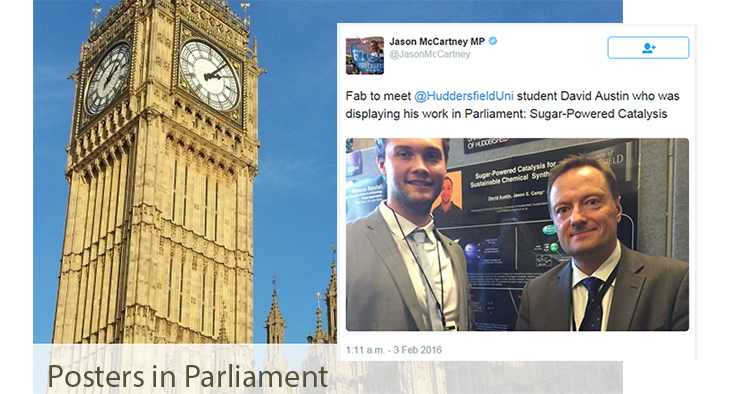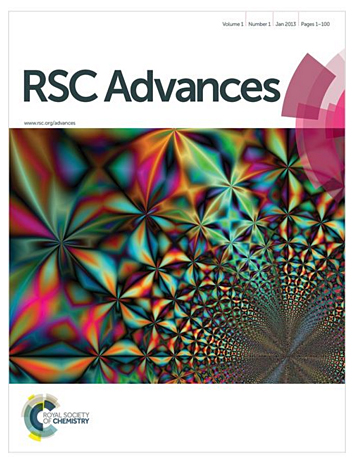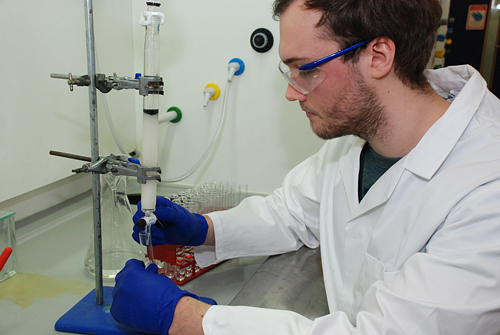Researchers harness the reducing potential of renewable sugars

Tue, 16 Feb 2016 14:53:00 GMT
Dr Jason Camp’s work on sugar-powered catalysis “opens up exciting opportunities”
INSPIRED by nature, University of Huddersfield scientist Dr Jason Camp (pictured) is pioneering the use of simple sugars to power chemical reactions. It means that industries such as pharmaceuticals and agro-chemicals will have a renewable, inexpensive and non-toxic method of catalysis. The project has received financial backing from several leading firms.
is pioneering the use of simple sugars to power chemical reactions. It means that industries such as pharmaceuticals and agro-chemicals will have a renewable, inexpensive and non-toxic method of catalysis. The project has received financial backing from several leading firms.
 Dr Camp, who is a Senior Lecturer in the Department of Chemical Sciences at the University’s School of Applied Sciences, has been exploring sugar-powered catalysis for the last six years. He heads a group of scientists at Huddersfield and also the University of Nottingham – where he was previously based - who are carrying out the research. Their findings are being relayed in presentations and articles, with the latest appearing in the new edition of RSC Advances, published by the Royal Society of Chemistry.
Dr Camp, who is a Senior Lecturer in the Department of Chemical Sciences at the University’s School of Applied Sciences, has been exploring sugar-powered catalysis for the last six years. He heads a group of scientists at Huddersfield and also the University of Nottingham – where he was previously based - who are carrying out the research. Their findings are being relayed in presentations and articles, with the latest appearing in the new edition of RSC Advances, published by the Royal Society of Chemistry.
The article concludes with the claim that “our study provides the groundwork for a simple technology that opens up exciting opportunities” by harnessing the reducing potential of renewable sugars.
The concept of sugar-powered catalysis has also attracted interest at the House of Commons, when University of Huddersfield chemistry student David Austin – who has been working with Dr Camp – took part in an event showcasing the UK’s best undergraduate research.
Dr Camp said that although biological processes were the basis for his work, the research is pure chemistry. “We are inspired by nature, but we don’t use enzymes or biological processes.”
Sugars have been used for catalysis in the past, said Dr Camp, but techniques such as advanced spectroscopy have enabled him and his co-researchers to make key breakthroughs such as the requirement to minimize oxygen from the system in order to allow for a sugar-powered process.
The researchers have investigated a variety of reducing sugars – including sucrose and fructose – but glucose has become their principal focus. Dr Camp and his team are also examining the use of environmentally-benign solvent that contains no oil-derived substances. To this end, a collaboration has been formed with the multi-national company Circa, which is a pioneer in the processing of cellulose into a novel green solvent.
Dr Camp and his team have also attracted financial backing from a wide range of UK-based companies, including AstraZeneca, Pfizer, GlaxoSmithKline, Vertex and Johnson Matthey.
Posters in Parliament
 ► Student researcher David Austin
► Student researcher David Austin
Sugar-powered catalysis has many potential applications, said Dr Camp, who is currently exploring its use its use the development of novel dyes for solar-cell in collaboration with Dr Elizabeth Gibson of the University of Newcastle.
But he anticipates that agro-chemistry and pharmaceuticals will be the principal industries to use the new technology that he is developing, appreciating the cost and environmental benefits of using sugars.
At the University of Huddersfield, Dr Camp has PhD researcher Thomas Bousfield working with him on sugar-powered catalysis. Undergraduate David Austin, who completes his four-year MChem degree this year, has also participated in the research, working on using sugars as the catalyst for producing drug-like molecules.
Huddersfield-born David – who studied at Rastrick High School and Huddersfield New College before embarking on his degree – created a poster describing the sugar-powered catalysis concept and entered it into a contest organised by the British Conference of Undergraduate Research. It was selected for display at the prestigious Posters in Parliament event, described as “a remarkable collection of the best undergraduate research from across the country”. Among visitors to the event was Colne Valley MP Jason McCartney, who tweeted the encounter.
 David spent the year-long work-placement component of his degree course at the Halifax plant of chemical industry multi-national Solvay. Keen to continue working on industrially-relevant chemistry, he saw Dr Camp’s project as an ideal opportunity and he is convinced of its potential.
David spent the year-long work-placement component of his degree course at the Halifax plant of chemical industry multi-national Solvay. Keen to continue working on industrially-relevant chemistry, he saw Dr Camp’s project as an ideal opportunity and he is convinced of its potential.
- The article Recyclable glucose-derived palladium(0) nanoparticles as in situ-formed catalysts for cross-coupling reactions in aqueous media by Jason E. Camp, Jay J. Dunsford, Oliver S. G. Dacosta, Rebecca K. Blundell, James Adams, Joshua Britton, Robert J. Smith, Thomas W. Bousfield and Michael W. Fay is in RSC Advances Issue 20, 2016







